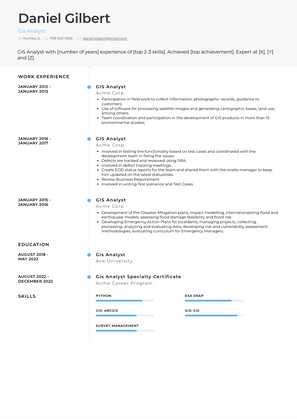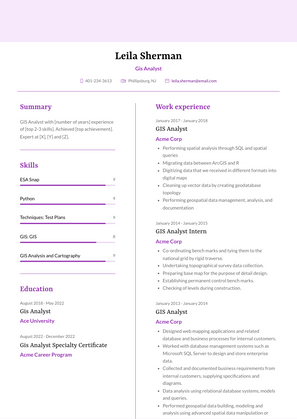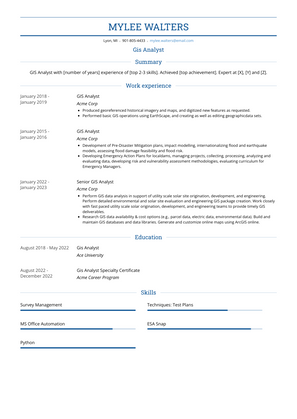3+ Gis Analyst Resume Examples and Templates
This page provides you with Gis Analyst resume samples to use to create your own resume with our easy-to-use resume builder. Below you'll find our how-to section that will guide you through each section of a Gis Analyst resume.



How to Write a GIS Analyst Resume?
To write a professional GIS Analyst resume, follow these steps:
- Select the right GIS Analyst resume template.
- Write a professional summary at the top explaining your GIS Analyst’s experience and achievements.
- Follow the STAR method while writing your GIS Analyst resume’s work experience. Show what you were responsible for and what you achieved as a GIS Analyst.
- List your top GIS Analyst skills in a separate skills section.
How to Write Your GIS Analyst Resume Header?
Write the perfect GIS Analyst resume header by:
- Adding your full name at the top of the header.
- Add a photo to your resume if you are applying for jobs outside of the US. For applying to jobs within the US, avoid adding photo to your resume header.
- Add your current GIS Analyst to the header to show relevance.
- Add your current city, your phone number and a professional email address.
- Finally, add a link to your portfolio to the GIS Analyst resume header. If there’s no portfolio link to add, consider adding a link to your LinkedIn profile instead.
Bad GIS Analyst Resume Example - Header Section
Valentin 696 Rock Maple St. South Lyon, MI 48178 Marital Status: Married, email: cooldude2022@gmail.com
Good GIS Analyst Resume Example - Header Section
Valentin Ross, Lyon, MI, Phone number: +1-555-555-5555, Link: linkedin/in/johndoe
Make sure to add a professional looking email address while writing your resume header. Let’s assume your name is John Doe - here is a formula you can use to create email addresses:
- firstnamelastname@email.com - johndoe@email.com
- firstname.lastname@email.com - john.doe@email.com
- lastname.firstname@email.com - doe.john@email.com
- f.lastname@email.com - j.doe@email.com
- l.firstname@email.com - d.john@email.com
- firstnamelastname12@email.com - johndoe12@email.com
For a GIS Analyst email, we recommend you either go with a custom domain name (john@johndoe.com) or select a very reputed email provider (Gmail or Outlook).
How to Write a Professional GIS Analyst Resume Summary?
Use this template to write the best GIS Analyst resume summary: GIS Analyst with [number of years] experience of [top 2-3 skills]. Achieved [top achievement]. Expert at [X], [Y] and [Z].
How to Write a GIS Analyst Resume Experience Section?
Here’s how you can write a job winning GIS Analyst resume experience section:
- Write your GIS Analyst work experience in a reverse chronological order.
- Use bullets instead of paragraphs to explain your GIS Analyst work experience.
- While describing your work experience focus on highlighting what you did and the impact you made (you can use numbers to describe your success as a GIS Analyst).
- Use action verbs in your bullet points.
GIS Analyst Resume Example
GIS Analyst
- Prepare training materials for clients.
- Establish networks, including relationships with OEMs and distributors.
- Sourcing of Mapping and Surveying Equipment.
Senior GIS Analyst Resume Example
Senior GIS Analyst
- Perform GIS data analysis in support of utility scale solar site origination, development, and engineering. Perform detailed environmental and solar site evaluation and engineering GIS package creation. Work closely with fast paced utility scale solar origination, development, and engineering teams to provide timely GIS deliverables.
- Research GIS data availability & cost options (e.g., parcel data, electric data, environmental data). Build and maintain GIS databases and data libraries. Generate and customize online maps using ArcGIS online.
GIS Analyst and Ecologist Resume Example
GIS Analyst and Ecologist
- Manage and implement county-wide biological monitoring projects and geospatial analysis
- Conceptualize, design, develop, and test new GIS solutions for department-wide use
- Develop web-based and desktop GIS applications (ArcGIS Online, ArcGIS Enterprise, ArcPro, ArcMap, WebApp Builder, GeoApps, and Dashboards)
- Prepare and execute workflows and geoprocessing models using Python
- Produce high quality data visualizations to guide management decisions.
GIS Analyst Resume Example
GIS Analyst
- Managed projects involving biological monitoring, restoration, and listed-species surveys
- Utilized ESRI products to process, manage, and analyze data
- Created maps and conducted geospatial analysis to inform biological monitoring efforts
- Collaborated with state, federal, and private agencies in order to accomplish shared goals
GIS Analyst Resume Example
GIS Analyst
- Produced georeferenced historical imagery and maps, and digitized new features as requested.
- Performed basic GIS operations using EarthScape, and creating as well as editing geographicdata sets.
GIS Analyst Resume Example
GIS Analyst
- Produced georeferenced historical imagery and maps, and digitized new features as requested.
- Performed basic GIS operations using EarthScape, and creating as well as editing geographicdata sets.
GIS Analyst Resume Example
GIS Analyst
- Performing spatial analysis through SQL and spatial queries
- Migrating data between ArcGIS and R
- Digitizing data that we received in different formats into digital maps
- Cleaning up vector data by creating geodatabase topology
- Performing geospatial data management, analysis, and documentation
GIS Analyst Resume Example
GIS Analyst
- Involved in testing the functionality based on test cases and coordinated with the development team in fixing the issues.
- Defects are tracked and reviewed using JIRA
- Involved in defect tracking meetings.
- Create EOD status reports for the team and shared them with the onsite manager to keep him updated on the latest status/risks.
- Review Business Requirement
- Involved in writing Test scenarios and Test Cases.
GIS Analyst Resume Example
GIS Analyst
- Development of Pre-Disaster Mitigation plans, impact modelling, internationalizing flood and earthquake models, assessing flood damage feasibility and flood risk.
- Developing Emergency Action Plans for localdams, managing projects, collecting, processing, analyzing and evaluating data, developing risk and vulnerability assessment methodologies, evaluating curriculum for Emergency Managers.
GIS Analyst Intern Resume Example
GIS Analyst Intern
- Co-ordinating bench marks and tying them to the national grid by rigid traverse.
- Undertaking topographical survey data collection.
- Preparing base map for the purpose of detail design.
- Establishing permanent control bench marks.
- Checking of levels during construction.
GIS Analyst Resume Example
GIS Analyst
- Designed web mapping applications and related database and business processes for internal customers.
- Worked with database management systems such as Microsoft SQL Server to design and store enterprise data.
- Collected and documented business requirements from internal customers, supplying specifications and diagrams.
- Data analysis using relational database systems, models and queries.
- Performed geospatial data building, modeling and analysis using advanced spatial data manipulation or cartographic procedures.
- Balanced multiple work tasks related to the implementation of GIS geodatabase and application design in an enterprise environment.
GIS Analyst Resume Example
GIS Analyst
- Participation in field work to collect information, photographic records, guidance to customers;
- Use of software for processing satellite images and generating cartographic bases, land use, among others.
- Team coordination and participation in the development of GIS products in more than 15 environmental studies;
Top GIS Analyst Resume Skills for 2024
- Geographic Information Systems (GIS) software proficiency (e.g., ArcGIS, QGIS)
- Spatial analysis
- Data management
- Database design and management
- Geospatial data modeling
- Cartography
- Remote sensing
- Geodatabase development
- Data visualization
- GPS data collection and integration
- Spatial statistics
- Network analysis
- Terrain analysis
- 3D visualization
- Spatial interpolation
- Geocoding
- Address matching
- Georeferencing
- Image analysis
- Lidar data processing
- Drone mapping
- Web GIS development
- Mobile GIS applications development
- Python scripting for GIS automation
- R programming for spatial analysis
- SQL for geospatial database queries
- Metadata creation and management
- Quality assurance and quality control (QA/QC) for spatial data
- Environmental modeling
- Urban planning applications
- Natural resource management applications
- Emergency response and disaster management applications
- Land use and land cover classification
- Spatial decision support systems (SDSS)
- Environmental impact assessment (EIA)
- Ecological niche modeling
- Hydrological modeling
- Climate change analysis
- Spatial data standardization
- Data conversion and transformation
- Data integration from multiple sources
- Data validation and cleaning
- Geospatial web services (e.g., WMS, WFS)
- Version control for GIS projects
- Geospatial metadata standards (e.g., ISO 19115)
- Project management for GIS projects
- Communication skills for presenting geospatial data and analysis results
- Collaboration skills for working in interdisciplinary teams
- Continuous learning and professional development in GIS technology
- Ethical conduct and integrity in handling geospatial data
How Long Should my GIS Analyst Resume be?
Your GIS Analyst resume length should be less than one or two pages maximum. Unless you have more than 25 years of experience, any resume that’s more than two pages would appear to be too long and risk getting rejected.
On an average, for GIS Analyst, we see most resumes have a length of 2. And, that’s why we advise you to keep the resume length appropriate to not get rejected.
How can I highlight my experience as a GIS Analyst on my resume?
To highlight your experience as a GIS Analyst, focus on your expertise in geographic information systems, spatial analysis, and data management. Detail your role in mapping, analyzing, and interpreting geographic data to support decision-making processes. Mention specific projects you've worked on, such as environmental impact assessments, urban planning, or resource management. Include examples of how your analytical skills contributed to improving project outcomes or enhancing data accuracy.
What are the key skills to feature on a GIS Analyst's resume?
Key skills to feature on a GIS Analyst's resume include proficiency in GIS software (like ArcGIS or QGIS), data analysis, spatial thinking, and cartography. Highlight your ability to manage and manipulate large datasets, create informative maps, and perform complex spatial analyses. Also, emphasize your skills in programming languages relevant to GIS, such as Python or SQL, which are often essential for customizing analyses and automating tasks.
How do I demonstrate my ability to manage large datasets on my resume?
Demonstrate your ability to manage large datasets by detailing your experience with data collection, cleaning, and analysis. Mention specific tools and methods you've used for data management, such as database management systems (DBMS), GIS software, or cloud storage solutions. Provide examples of how you’ve ensured data integrity and accessibility, and how this capability has supported larger projects.
Should I include metrics on my GIS Analyst resume? If so, what kind?
Yes, including metrics on your GIS Analyst resume can be very effective. For example, you could mention the scale or scope of datasets you have managed, the number of maps produced for various projects, or the percentage increase in data efficiency or accuracy achieved through your optimizations. Metrics that demonstrate your direct impact on project efficiency and outcomes are particularly valuable.
How can I showcase my experience with spatial analysis on my resume?
Showcase your experience with spatial analysis by describing specific projects where you applied spatial algorithms and statistical methods to solve geographical problems. Discuss the outcomes of these analyses, such as identifying trends, predicting patterns, or optimizing routes. Highlight any innovative techniques you developed or adapted to meet unique project needs.
What kind of achievements should I highlight as a GIS Analyst?
Highlight achievements such as developing a new mapping technique that was adopted across the organization, significantly improving the accuracy of spatial data used in critical decision-making, or leading a project that received recognition from a professional association. You could also mention any successful collaborations with governmental or environmental organizations that led to impactful changes based on your GIS work.
How do I address a lack of experience in a specific area of GIS on my resume?
If you lack experience in a specific area of GIS, focus on your foundational GIS skills and how they can be easily adapted to different contexts or projects. Highlight your continuous learning efforts, such as attending workshops, completing courses, or participating in conferences related to GIS. Mention any related skills or experiences that demonstrate your ability to quickly learn and apply new GIS technologies or methods.
How important is software proficiency for a GIS Analyst role?
Software proficiency is crucial for a GIS Analyst role, as it enables the effective manipulation, analysis, and visualization of spatial data. Highlight your skills in industry-standard GIS software such as ArcGIS or QGIS, and mention any additional software tools you are proficient in, such as remote sensing software or database management systems that complement your GIS work.
How do I demonstrate my ability to work collaboratively on GIS projects on my resume?
Demonstrate your ability to work collaboratively on GIS projects by detailing your involvement in teams or collaborations that required interdisciplinary knowledge. Discuss how you communicated spatial data findings to non-GIS experts, contributed to team meetings, and supported project goals through your specialized skills. Highlight any projects where your input was crucial to achieving a successful outcome.
Should I include certifications on my GIS Analyst resume?
Including relevant certifications can enhance your GIS Analyst resume by demonstrating your commitment to professional development and expertise in your field. Certifications such as GISP (Certified GIS Professional), Esri Technical Certification, or other specific software certifications can be beneficial, showcasing your skills and dedication to staying current in the field.
-
How can I highlight my experience as a GIS Analyst on my resume?
-
What are the key skills to feature on a GIS Analyst's resume?
-
How do I demonstrate my ability to manage large datasets on my resume?
-
Should I include metrics on my GIS Analyst resume? If so, what kind?
-
How can I showcase my experience with spatial analysis on my resume?
-
What kind of achievements should I highlight as a GIS Analyst?
-
How do I address a lack of experience in a specific area of GIS on my resume?
-
How important is software proficiency for a GIS Analyst role?
-
How do I demonstrate my ability to work collaboratively on GIS projects on my resume?
Copyright ©2024 Workstory Inc.
